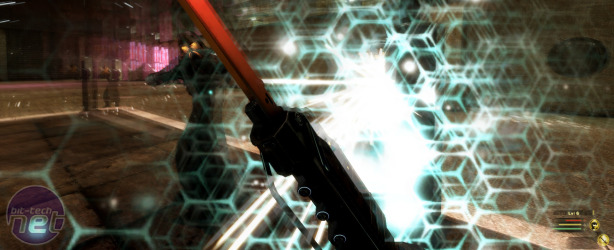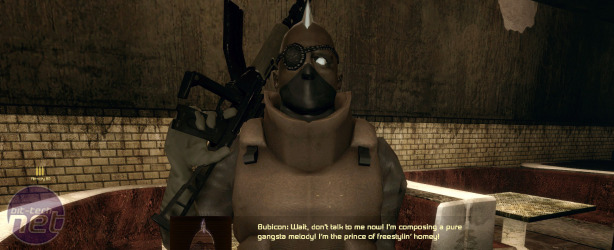
Divine Cybermancy Review
This clashing of high-budget ambition and indie production values is a recurring problem for Divine Cybermancy, but it's also a distraction. The indie roots and lack of resources mean that some obvious corners have been cut, so while there are occasional bursts of foreign voice acting, for example, most of the narrative is delivered solely through text.The level of immersion is also limited by levels which, while massive, lack the clutter or populous that would bring them to life. Early missions that have you fighting through the streets of a mega-city, for example, feel ghostly and empty, simply because of the lack of decent sound design or background characters.
We could easily overlook the problems caused by the limits of the budget, however, if the rest of Divine Cybermancy was competently put together. Unfortunately, though, that's not the case and huge swathes of the game are bafflingly over or under-explained. Constant in-game prompts refer you to an in-game library, which takes the place of conventional tutorials and which is full of videos of varying usefulness.
The video that explains how you're supposed to reload your weapon, for example, takes 30 seconds to tell you how to open your character menu, navigate to your skill subsection, find the reload skill and click it. 'This will reload your weapon,' it ends, '...Or you can also press R to reload.'
It's funny because it gives you too much information, right? Well, contrast that with Divine Cybermancy's advice on in-game deaths; 'You just wake up after your death, but be careful, you went mad.'
Similar situations occur mid-mission, when your character spontaneously reveals information of his own or claims his sources have told him certain facts. Um, no they haven't.
Your character strangely permeates through into some of the HUD prompts too, so messages will run across the bottom of the screen when you're in the middle of gunfights - 'Bull****!!! Critical-ultra fail attack!' Luckily, the combat feels punchy and responsive enough to remain fun, despite the fact that some weapons are hilariously overbalanced. Your basic sniper rifle, for example, takes down all enemies in just two or three shots with 100 per cent accuracy and no recoil or wobble. You can choose this gun at the end of the first level.
Then again, while it's tempting to stick to just your sniper rifle, especially when stealth is all but impossible and enemy snipers can spot you a mile away, this would result in you missing out on some of the best character skills. Some of the apparent advantages of being a religious cyborg meta-man are that you can possess enemies, conjure clones and hack enemy turrets with ease. It's great fun.
We realise that this barrage of pluses and minuses isn't at all consistent, by the way - the combat is good, but the weapons are bad, but the powers are good and so on. Unfortunately, that's a realistic representation of what Divine Cybermancy feels like. There are some truly fantastic ideas, but they're all jumbled up and beyond the point of recognition; as Boiling Point is to Far Cry, EYE is to Deus Ex.
Doubtless, there will be a hardcore cadre of players who will spend the next three years fixing and fawning over Divine Cybermancy - and good on them, because we really want to like Divine Cybermancy. It's full of so many options and ideas and artistic potential. Unfortunately, though, none of these factors are well enough implemented to make Divine Cybermancy a game we can really recommend or personally tolerate.
-
Overall45 / 100


MSI MPG Velox 100R Chassis Review
October 14 2021 | 15:04











Want to comment? Please log in.